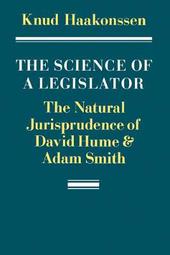
|
The Science of a Legislator: The Natural Jurisprudence of David Hume and Adam Smith
Paperback / softback
Main Details
| Title |
The Science of a Legislator: The Natural Jurisprudence of David Hume and Adam Smith
|
| Authors and Contributors |
By (author) Knud Haakonssen
|
| Physical Properties |
| Format:Paperback / softback | | Pages:252 | | Dimensions(mm): Height 230,Width 154 |
|
| ISBN/Barcode |
9780521376259
|
| Classifications | Dewey:340.0922 |
|---|
| Audience | | Professional & Vocational | |
|---|
| Illustrations |
Worked examples or Exercises
|
|
Publishing Details |
| Publisher |
Cambridge University Press
|
| Imprint |
Cambridge University Press
|
| Publication Date |
28 July 1989 |
| Publication Country |
United Kingdom
|
Description
Combining the methods of the modern philosopher with those of the historian of ideas, Knud Haakonssen presents an interpretation of the philosophy of law which Adam Smith developed out of - and partly in response to - David Hume's theory of justice. While acknowledging that the influences on Smith were many and various, Dr Haakonssen suggests that the decisive philosophical one was Hume's analysis of justice in A Treatise of Human Nature and the second Enquiry. He therefore begins with a thorough investigation of Hume, from which he goes on to show the philosophical originality of Smith's new form of natural jurisprudence. At the same time, he provides an over all reading of Smith's social and political thought, demonstrating clearly the exact links between the moral theory of The Theory of Moral Sentiments, the Lectures on Jurisprudence, and the sociohistorical theory of The Wealth of Nations. This is the first full analysis of Adam Smith's jurisprudence; it emphasizes its normative and critical function, and relates this to the psychological, sociological, and histroical aspects which hitherto have attracted most attention. Dr Haakonssen is critical of both purely descriptivist and utilitarian interpretations of Smith's moral and political philosophy, and demonstrates the implausibility of regarding Smith's view of history as pseudo-economic or 'materialist'.
Reviews'This excellent book is aimed, in a sense, at completing the last great work which Adam Smith projected ... The first major study of Smith's legal and political philosophy which takes account of the new edition of the Lectures on Jurisprudence, it skilfully and persuasively reconstructs a Smithian theory of justice and of positive law, showing the critical edge of the former as applicable to the latter ... As well as making a first-class contribution to Smith studies, this book is in its own right an important statement in legal and political philosophy.'
|